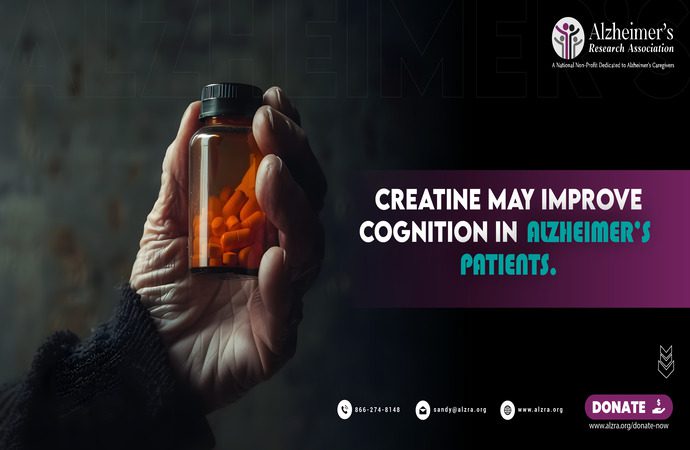Researchers at the University of Kansas conducted a pilot study to investigate creatine supplementation in Alzheimer’s patients, revealing modest cognitive improvements.. The eight-week study demonstrated that supplementation resulted in increased levels of creatine in the brain and improved cognitive function. Although preliminary data seem encouraging, large trials are still required. For years, athletes have been
Researchers at the University of Kansas conducted a pilot study to investigate creatine supplementation in Alzheimer’s patients, revealing modest cognitive improvements.. The eight-week study demonstrated that supplementation resulted in increased levels of creatine in the brain and improved cognitive function. Although preliminary data seem encouraging, large trials are still required.
For years, athletes have been using creatine as a dietary supplement to increase muscle energy and boost their athletic performance. Now, a pilot study at the University of Kansas Medical Center suggests that this supplement may offer another potential new health benefit: enhancing the cognitive functioning in people with Alzheimer’s disease.
The primary goal of this study, the first to examine the effects of creatine on individuals with dementia or Alzheimer’s disease, was to determine whether taking creatine supplements was safe and practical for these patients. However, the researchers also discovered that working memory and executive function seem to have improved somewhat as a result of the supplements.
The study’s lead investigator, Matthew Taylor, Ph.D., an assistant professor of dietetics and nutrition at the KU School of Health Professions, stated that these initial findings showed the advantages of creatine, which is a compelling reason for conducting more clinical trials with greater sample sizes [1].
The journal Alzheimer’s & Dementia: Translational Research & Clinical Interventions published the findings [2].
What is Creatine?
Some athletes and fitness enthusiasts use creatine to improve their physical performance. However, lately, its role in cognitive function has come into focus. So, what is creatine, and where is it found?
Creatine is a naturally occurring chemical found in our bodies and ingested in food, particularly animal products. The human body generates about 1 gram (g) of creatine per day, primarily in the liver and kidneys, and to a lesser extent, in the pancreas [3]. It consists of three amino acids. Approximately 95% of the body’s creatine is stored in skeletal muscle and the brain [4].
Creatine is of interest to sports scientists because it aids in the body’s regeneration of adenosine triphosphate (ATP), the primary energy source for our cells.
Creatine can transfer a phosphate group, allowing our tissues to replenish ATP. Some theories suggest that the brain’s ability to restore excess energy may help buffer against low-energy situations such as stress and sleep deprivation [5].
The Recent Study: Increasing Creatine Levels in the Brain
There is an issue with the brain’s energy production and utilization in Alzheimer’s disease. Creatine, an organic molecule found predominantly in muscle but also in the brain, is essential for energy metabolism.
Cell mitochondria produce energy molecules from oxygen and nutrients. The function of creatine is to transport energy to its destination. The researchers believe that increasing creatine levels in the brain can enhance brain activity and potentially improve cognitive function and memory.
People often take 5 grams of creatine daily to increase their muscle strength and sports performance. Since creatine enters the muscles from the blood first, the researchers in the recent study examined a higher dosage to enhance the chances of creatine reaching the brain [1,2].
For this trial, the researchers recruited 19 Alzheimer’s patients aged 60 to 90 through the KU Alzheimer’s Disease Research Center. The participants took 20 grams of creatine monohydrate, a powder that can be mixed into any beverage, every day for eight weeks.
Blood samples were taken at baseline, four weeks, and eight weeks. The patients also underwent magnetic resonance spectroscopy imaging at baseline and eight weeks to detect creatine in the brain. In addition to proving that the supplement dosage was practical and well-tolerated by the participants, the study revealed an 11% rise in brain creatine levels.
The researchers hypothesized that differences in transit across the blood-brain barrier could account for some of this variability. It is the first study to show that using creatine supplements can raise brain creatine levels in Alzheimer’s patients.
Improvement in Cognitive Function
To measure participants’ cognitive changes, the researchers employed the NIH Toolbox Cognition Battery at the beginning and the end of the trial. Working memory, or task-oriented memory, which Taylor compared to the memory needed for the traditional card-matching game Concentration, showed a moderate improvement.
Participants exhibited a slight improvement in executive functioning, a cognitive domain significantly affected by Alzheimer’s disease, which involves the ability to concentrate and filter out distractions.
In conclusion, researchers observed improvements in several cognitive tests and increases in brain creatine levels in patients with Alzheimer’s disease after eight weeks of supplementing with 20 grams of creatine. There was also a slight indication that some of these changes were connected with the changes in brain creatine.
Limitations and Future Prospects
The study’s limitations include the lack of a control group and the sample size. However, the study is the first to show that creatine supplementation is safe for Alzheimer’s patients and may even improve their cognitive function.
Taylor added that future studies will investigate the molecular processes underlying any cognitive changes linked to creatine supplementation. Furthermore, creatine may also help reduce oxidative stress and inflammation, which are key contributors to brain aging and neurodegenerative illnesses. Oxidative stress is the gradual buildup of unstable oxygen-containing molecules called free radicals. They still don’t fully understand this molecule’s function in the brain, according to Taylor.
Alzheimer’s Research Association is a non-profit organization dedicated to helping caregivers of Alzheimer’s disease and dementia. We provide the latest information and news about the illness and helpful tips to help caregivers cope with their daily caregiving challenges. We realize the most important thing that a caregiver needs is financial assistance. Therefore, we provide grants to caregivers to ease their financial burden. Caregivers can apply for grants here: https://www.alzra.org/grant-applications/.
You can also help caregivers in their endeavor by donating as much as possible: https://www.alzra.org/donate-now/.
References
- Birch, K. Creatine shows potential to boost cognition in Alzheimer’s patients. KU Medical Center Kansas The University of Kansas. https://www.kumc.edu/about/news/news-archive/creatine-alzheimers-research.html. Published Online: 4th June, 2025. Accessed: 19th August, 2025.
- Smith, A.N., Choi, I.Y., Lee, P., Sullivan, D.K., Burns, J.M., Swerdlow, R.H., Kelly, E. and Taylor, M.K., 2025. Creatine monohydrate pilot in Alzheimer’s: Feasibility, brain creatine, and cognition. Alzheimer’s & Dementia: Translational Research & Clinical Interventions, 11(2), p.e70101.
- Cooper, R., Naclerio, F., Allgrove, J. and Jimenez, A., 2012. Creatine supplementation with specific view to exercise/sports performance: an update. Journal of the International Society of Sports Nutrition, 9(1), p.33.
- Gutiérrez-Hellín, J., Del Coso, J., Franco-Andrés, A., Gamonales, J.M., Espada, M.C., González-García, J., López-Moreno, M. and Varillas-Delgado, D., 2025. Creatine Supplementation Beyond Athletics: Benefits of Different Types of Creatine for Women, Vegans, and Clinical Populations—A Narrative Review. Nutrients, 17(1), p.95.
- Moriarty, T., Bourbeau, K., Dorman, K., Runyon, L., Glaser, N., Brandt, J., Hoodjer, M., Forbes, S.C. and Candow, D.G., 2023. Dose–response of creatine supplementation on cognitive function in healthy young adults. Brain Sciences, 13(9), p.1276.
- Perlmutter, A. New Research on Creatine Monohydrate for Alzheimer’s Disease. Psychology Today. https://www.psychologytoday.com/us/blog/the-modern-brain/202505/new-research-on-creatine-monohydrate-for-alzheimers-disease. Published Online: 26th May, 2025. Accessed: 19th August, 2025.
- Newman, T. Sleep deprived? Study finds creatine supplements may improve cognitive performance. Medical News Today. https://www.medicalnewstoday.com/articles/creatine-improves-cognitive-performance-sleep-deprivation-study. Published Online: 2nd May, 2024. Accessed: 19th August, 2025.


















Leave a Comment
Your email address will not be published. Required fields are marked with *